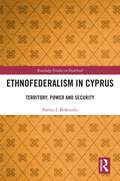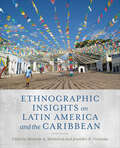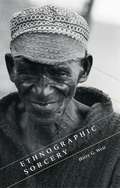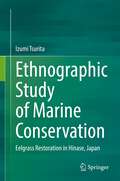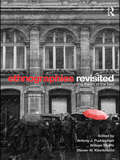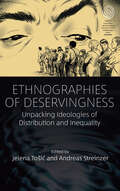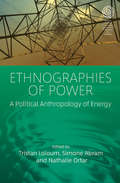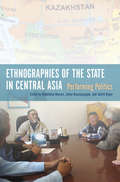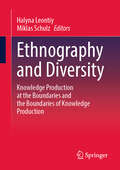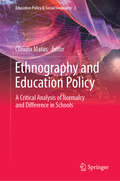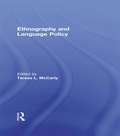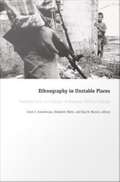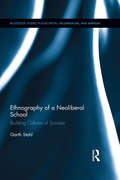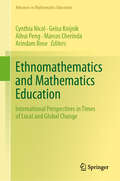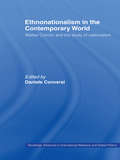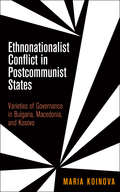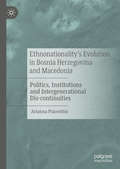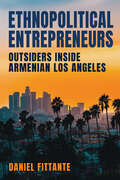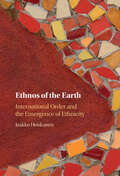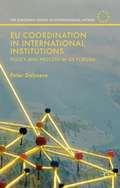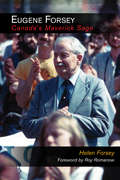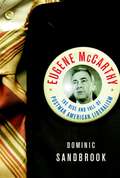- Table View
- List View
Ethnofederalism in Cyprus: Territory, Power and Security (Routledge Studies in Statehood)
by Pavlos I. KoktsidisThis book develops a holistic understanding of the intrinsic security concerns which lie at the heart of the protracted conflict in Cyprus.This work offers a well-grounded account of intractability in Cyprus by unfolding the rationale and prevalence of competitive approaches held by Greek and Turkish Cypriots alike. The analysis explains how crude security interests give birth to an existentialist security dilemma that has so far prevented Greek and Turkish Cypriots, and their security guarantors, from reaching a durable settlement. This book contains a systematic critique of the breadth and depth of the major security concerns embedded in the proposed federal bi‑zonal framework for Cyprus, uncovering the impetus and rationale of the underlying insecurities that prompt the Greek and Turkish sides to compete on a series of state‑building aspects, including the opposing understandings of self‑determination and sovereignty, the competitive underpinnings of federal institutional design, and the problematic role of third‑party involvement. This book ultimately unravels a deeper and more pragmatic understanding of how competitive security considerations and geopolitical considerations link up to ethno‑federal design in post‑conflict environments.This book will be of much interest to students of conflict studies, federalism studies, statebuilding, European politics, and International Relations.
Ethnografie familienanaloger Formen der Hilfen zur Erziehung: Über Orte der Fremdunterbringung und des Zusammenwohnens (Kasseler Edition Soziale Arbeit #23)
by Maximilian SchäferMaximilian Schäfer untersucht in der Studie die Wirklichkeitskonstruktionen im Feld der familienanalogen Formen der Hilfen zur Erziehung. Im Rahmen von drei ethnografischen Fallrekonstruktionen und eines Fallvergleichs werden die Rahmenbedingungen, die Bedeutungszuschreibungen der Protagonist*innen, die Weisen des wohnräumlichen Zusammenlebens sowie die pädagogischen Handlungsweisen in Alltagssituationen analysiert. Die Feldstudie gewährt einerseits umfassende Einblicke in die bislang selten untersuchte Alltagspraxis an Orten der Fremdunterbringung, die in der Praxis als Erziehungsstellen, sozialpädagogische Lebensgemeinschaften oder familienanaloge Wohngruppen bezeichnet werden. Andererseits leistet sie einen empirisch fundierten Beitrag zur Fachdebatte mit zahlreichen Reflexionsangeboten für Interessierte an stationären Hilfen zur Erziehung.
Ethnographic Insights on Latin America and the Caribbean
by Melanie A. Medeiros Jennifer R. GuzmánEthnographic Insights on Latin America and the Caribbean offers a compelling introduction to the region by providing a series of ethnographic case studies that examine the most pressing issues communities are facing today. These case studies address key topics such as inequities during the COVID-19 pandemic, anti-Black racism, resistance against extractive industries, migration and transnational families, revitalization of Indigenous languages, art and solidarity in the wake of political violence, resilience in the face of climate change, and recent social movements. Designed for courses in a variety of disciplines, this expansive volume is organized in thematic sections, with introductions that draw important connections between chapters. The first section provides essential background on ethnography, archaeology, and history, while chapters in the following sections center local perspectives, strategies, and voices. Each chapter ends with reflection and discussion questions, key concepts with definitions, and resources to explore further. Presenting a snapshot of life during the early decades of the twenty-first century, Ethnographic Insights on Latin America and the Caribbean illuminates the structural forces and human agency that are determining the future of the region and the world.
Ethnographic Sorcery
by Harry G. WestAccording to the people of the Mueda plateau in northern Mozambique, sorcerers remake the world by asserting the authority of their own imaginative visions of it. While conducting research among these Muedans, anthropologist Harry G. West made a revealing discovery---for many of them, West's efforts to elaborate an ethnographic vision of their world was itself a form of sorcery. In Ethnographic Sorcery, West explores the fascinating issues provoked by this equation. A key theme of West's research into sorcery is that one sorcerer's claims can be challenged or reversed by other sorcerers. After West's attempt to construct a metaphorical interpretation of Muedan assertions that the lions prowling their villages are fabricated by sorcerers is disputed by his Muedan research collaborators, West realized that ethnography and sorcery indeed have much in common. Rather than abandoning ethnography, West draws inspiration from this connection, arguing that anthropologists, along with the people they study, can scarcely avoid interpreting the world they inhabit, and that we are all, inescapably, ethnographic sorcerers.
Ethnographic Study of Marine Conservation: Eelgrass Restoration in Hinase, Japan
by Izumi TsuritaThis book explores the nature of marine conservation based on the case study of Hinase, a fishing village in Okayama, Japan. It focuses on the fishers’ self-motivated eelgrass restoration activity which has been continued for more than 30 years. This activity in Hinase recently attracted international attention as a case under the name “Satoumi” and “Marine Protected Areas” in several governmental reports, but detailed information, such as the historical background and social structure of Hinase, has not yet been analyzed. This book, therefore, fulfills this gap by providing its ethnographic information. In addition, this book offers some points for critical thinking by concluding that marine conservation activities cannot always be evaluated or arranged under the standardized approach with limited time and space. This viewpoint reaffirms the importance of local initiative and highlights the value of qualitative research to seek the way forward for promising marine conservation. This book is suitable for an academic audience in the field of social sciences, such as applied anthropology, as well as ecologists, government officials, environmentalists, and citizens who are interested or engaged in environmental issues or natural resource management.
Ethnographies Revisited: Constructing Theory in the Field
by William Shaffir Antony J. Puddephatt Steven W. KleinknechtEthnographies Revisited provides first-hand accounts of how leading qualitative researchers crafted key theoretical concepts found in their major book-length ethnographies. Great ethnographic research lies not in the rigid execution of prescribed methodological procedures, but on the unrelenting cultivation of theoretical ideas. These contributors focus squarely on this neglected topic, providing reflexive accounts of how research decisions were made in light of emerging theoretical questions. The continuous generation of creative concepts is arguably the most important skill in developing powerful results in field research, since the originality of the ideas produced is how the study is ultimately judged. Yet, this topic is often taken for granted, treated rigidly and artificially, or is entirely absent from existing qualitative research manuals. In contrast, this volume offers candid insights of how leading ethnographers generated their initial questions, chose their research sites, made theoretical and methodological adjustments, and oriented their research to maximize the conceptual payoff, leading to such successful research contributions. This provides a fresh approach to the topic of qualitative research, by linking practical decisions in the field to the dynamic features of theory in the making, told through the first-hand experiences of some of the best ethnographers in our field.
Ethnographies of Deservingness: Unpacking Ideologies of Distribution and Inequality (EASA Series #45)
by Jelena Tošić Andreas StreinzerClaims around 'who deserves what and why' moralise inequality in the current global context of unprecedented wealth and its ever more selective distribution. Ethnographies of Deservingness explores this seeming paradox and the role of moralized assessments of distribution by reconnecting disparate discussions in the anthropology of migration, economic anthropology and political anthropology. This edited collection provides a novel and systematic conceptualization of Deservingness and shows how it can serve as a prime and integrative conceptual prism to ethnographically explore transforming welfare states, regimes of migration, as well as capitalist social reproduction and relations at large.
Ethnographies of Deservingness: Unpacking Ideologies of Distribution and Inequality (EASA Series #45)
by Jelena Tošić and Andreas StreinzerClaims around 'who deserves what and why' moralise inequality in the current global context of unprecedented wealth and its ever more selective distribution. Ethnographies of Deservingness explores this seeming paradox and the role of moralized assessments of distribution by reconnecting disparate discussions in the anthropology of migration, economic anthropology and political anthropology. This edited collection provides a novel and systematic conceptualization of Deservingness and shows how it can serve as a prime and integrative conceptual prism to ethnographically explore transforming welfare states, regimes of migration, as well as capitalist social reproduction and relations at large.
Ethnographies of Power: A Political Anthropology of Energy (EASA Series #42)
by Tristan Loloum, Simone Abram Nathalie OrtarEnergy related infrastructures are crucial to political organization. They shape the contours of states and international bodies, as well as corporations and communities, framing their material existence and their fears and idealisations of the future. Ethnographies of Power brings together ethnographic studies of contemporary entanglements of energy and political power. Revisiting classic anthropological notions of power, it asks how changing energy related infrastructures are implicated in the consolidation, extension or subversion of contemporary political regimes and discovers what they tell us about politics today.
Ethnographies of Social Support
by Markus Schlecker Friederike FleischerWhy do elderly choose to move away from their children so as to not receive their support? Using a number of case studies, contributors explore social support as a tool of mutuality, or maintaining relatedness and sharing feelings, rather than preventing or patching up problems. This book helps correct the dominant framework of deliberate action.
Ethnographies of the State in Central Asia
by Johan Rasanayagam Judith Beyer Madeleine ReevesWith fresh and provocative insights into the everyday reality of politics in post-Soviet Central Asia, this volume moves beyond commonplaces about strong and weak states to ask critical questions about how democracy, authority, and justice are understood in this important region. In conversation with current theories of state power, the contributions draw on extensive ethnographic research in settings that range from the local to the transnational, the mundane to the spectacular, to provide a unique perspective on how politics is performed in everyday life.
Ethnography and Diversity: Knowledge Production at the Boundaries and the Boundaries of Knowledge Production
by Halyna Leontiy Miklas SchulzThe focus of the volume is on ethnographically oriented research practice. It is reflected in the mirror of the currently controversial concepts of diversity and intersectionality in the cultural and social sciences. Special attention is paid to the question of how researchers deal with the methodological problem of the production, reproduction and reflection of categories. Which categories are already brought to the 'field', later revised or solidified, and which categories finally accompany the interpretation process and which constitute the presentation of results? How and why do they emerge? And last but not least: How are specific worlds of experience of human diversity co-produced or transformed by (research) categories? The Content Conceptual foundations - Diversity and inclusion in educational contexts - Interculture in diversity - Diversity in the field of tension between body, gender and disability The Editors Dr. rer. soc. Halyna Leontiy is Substitute Professor (Verwaltungsprofessorin) of Foundations of Social Sciences, Institute of Methods and Methodological Principles in the Social Sciences (IMMS), University of Goettingen, Germany since October 2021. Prof. Dr. phil. Miklas Schulz is a visiting researcher focusing on Inclusive Education and School Development at the Institute of Educational Science, Department of Applied Educational Science, at the University of Hildesheim.
Ethnography and Education Policy: A Critical Analysis of Normalcy and Difference in Schools (Education Policy & Social Inequality #3)
by Claudia MatusThis book addresses the relationship between the production of social problems in educational policy, the research practices required to inform policy, and the daily production of normalcies and differences in school contexts. It reports on the opportunities and consequences for policy, research, and practice when normalcy is stigmatized at the same level as difference. The book employs a critical analysis combining queer, feminist, and post-representational theories to understand the implications of dominant ways of understanding the division between normal and different subjectivities and how they reiterate structures of inequality in schools.
Ethnography and Language Policy
by Teresa L. McCartyIlluminating, through ethnographic inquiry, how individual agents "make" language policy in everyday social practice, this volume advances the growing field of language planning and policy using a critical sociocultural approach. From this perspective, language policy is conceptualized not only as official acts and documents, but as language-regulating modes of human interaction, negotiation, and production mediated by relations of power. Using this conceptual framework, the volume addresses the impacts of globalization, diaspora, and transmigration on language practices and policies; language endangerment, revitalization, and maintenance; medium-of-instruction policies; literacy and biliteracy; language and ethnic/national identity; and the ethical tensions in conducting critical ethnographic language policy research. These issues are contextualized in case studies and reflective commentaries by leading scholars in the field. Ethnography and Language Policy extends previous work in the field, tapping into leading-edge interdisciplinary scholarship, and charting new directions. Recognizing that language policy is not merely or even primarily about language per se, but rather about power relations that structure social-linguistic hierarchies, the authors seek to expand policy discourses in ways that foster social justice for all.
Ethnography in Unstable Places: Everyday Lives in Contexts of Dramatic Political Change
by Carol J. Greenhouse Elizabeth Mertz Kay B. WarrenEthnography in Unstable Places is a collection of ethnographic accounts of everyday situations in places undergoing dramatic political transformation. Offering vivid case studies that range from the Middle East and Africa to Europe, Russia, and Southeast Asia, the contributing anthropologists narrate particular circumstances of social and political transformation--in contexts of colonialism, war and its aftermath, social movements, and post-Cold War climates--from the standpoints of ordinary people caught up in and having to cope with the collapse or reconfiguration of the states in which they live. Using grounded ethnographic detail to explore the challenges to the anthropological imagination that are posed by modern uncertainties, the contributors confront the ambiguities and paradoxes that exist across the spectrum of human cultures and geographies. The collection is framed by introductory and concluding chapters that highlight different dimensions of the book's interrelated themes--agency and ethnographic reflexivity, identity and ethics, and the inseparability of political economy and interpretivism. Ethnography in Unstable Places will interest students and specialists in social anthropology, sociology, political science, international relations, and cultural studies. Contributors. Eve Darian-Smith, Howard J. De Nike, Elizabeth Faier, James M. Freeman, Robert T. Gordon, Carol J. Greenhouse, Nguyen Dinh Huu, Carroll McC. Lewin, Elizabeth Mertz, Philip C. Parnell, Nancy Ries, Judy Rosenthal, Kay B. Warren, Stacia E. Zabusky
Ethnography of a Neoliberal School: Building Cultures of Success (Routledge Studies in Education, Neoliberalism, and Marxism #14)
by Garth StahlAs a school ethnography, this book explores the controversial schooling practices and strategies embedded in charter school management organizations (CMOs), as well as how these practices influence teaching and learning, school leadership, teachers’ professional identities, and students’ understanding of success. By theorizing the common practices within the organization, Stahl connects current research in neoliberal governance, neoliberal structuring of educational policy, aspiration and social reproduction in schooling. Honing in on the discourse on education reform, Stahl demonstrates that a "unique blend" of neoliberalism and social justice values have permeated the CMO’s institutional culture, promoting the belief that adopting corporate practices will fix America’s schools and ensure equity of opportunity for all. The inclusion of institutional texts (emails, Blackberry messages, posters, and rubrics) balances the personal-subjective and inter-subjective to capture a blend of neoliberalism and social justice reframing.
Ethnomathematics and Mathematics Education: International Perspectives in Times of Local and Global Change (Advances in Mathematics Education)
by Arindam Bose Cynthia Nicol Gelsa Knijnik Aihui Peng Marcos CherindaThis edited volume examines ethnomathematics conceptions, pedagogical practices, and research from international perspectives in times of local and global challenges. The book explores connections between mathematical, cultural, political, and social practices toward more inclusive, holistic, creative, transdisciplinary and critical ways of engaging with knowledge and mathematical actions in society. In this edited book, the authors explore how ethnomathematics supports transformation of educational systems toward regaining cultural reclamation and self-confidence, challenges colonial logics for decolonizing and Indigenizing mathematics education, and engages with actions for critical and social justice issues.
Ethnonationalism in the Contemporary World: Walker Connor and the Study of Nationalism (Routledge Advances in International Relations and Global Politics)
by Daniele ConversiIn Ethnonationalism in the Contemporary World, world-renowned scholars employ various aspects of Connor's work to explicate the recent upsurge of nationalism on a global scale. In keeping with the growing awareness that the study of ethnonationalism requires an interdisciplinary approach, the contributors represent a number of academic disciplines, including anthropology, geography, history, linguistics, social psychology, sociology and world politics. The book discusses issues such as identity, ethnicity and nationalism, primordialism, social constructionism, ethnic conflict, separatism and federalism. It also features case studies on the Basque country, South Africa and Canada.
Ethnonationalist Conflict in Postcommunist States
by Maria KoinovaEthnonationalist Conflict in Postcommunist States investigates why some Eastern European states transitioned to new forms of governance with minimal violence while others broke into civil war. In Bulgaria, the Turkish minority was subjected to coerced assimilation and forced expulsion, but the nation ultimately negotiated peace through institutional channels. In Macedonia, periodic outbreaks of insurgent violence escalated to armed conflict. Kosovo's internal warfare culminated in NATO's controversial bombing campaign. In the twenty-first century, these conflicts were subdued, but violence continued to flare occasionally and impede durable conflict resolution.In this comparative study, Maria Koinova applies historical institutionalism to conflict analysis, tracing ethnonationalist violence in postcommunist states to a volatile, formative period between 1987 and 1992. In this era of instability, the incidents that brought majorities and minorities into dispute had a profound impact and a cumulative effect, as did the interventions of international agents and kin states. Whether the conflicts initially evolved in peaceful or violent ways, the dynamics of their disputes became self-perpetuating and informally institutionalized. Thus, external policies or interventions could affect only minimal change, and the impact of international agents subsided over time. Regardless of the constitutions, laws, and injunctions, majorities, minorities, international agents, and kin states continue to act in accord with the logic of informally institutionalized conflict dynamics.Koinova analyzes the development of those dynamics in Bulgaria, Macedonia, and Kosovo, drawing on theories of democratization, international intervention, and path-dependence as well as interviews and extensive fieldwork. The result is a compelling account of the underlying causal mechanisms of conflict perpetuation and change that will shed light on broader patterns of ethnic violence.
Ethnonationality’s Evolution in Bosnia Herzegovina and Macedonia: Politics, Institutions and Intergenerational Dis-continuities
by Arianna PiacentiniThis book is centred upon the concept of ‘ethnonationality,’ investigating how its meanings and functions have changed across political regimes, time, and generations. Piacentini explores two similar yet different realities, Bosnia Herzegovina and Macedonia (now North Macedonia) – both former Yugoslav republics, multiethnic, and currently characterised by consociational arrangements and ethnic politics. This temporal perspective encompasses both the Yugoslav and post-Yugoslav period, empirically exploring two generations living together in the same family, each socialised by different macro-environments and socio-political and economic conditions. The book explores which ideas, rules, and patterns of behaviour related to ethnonationality have been transmitted between the generations. Ethnonationality’s Evolution in Bosnia Herzegovina and Macedonia will be of interest to students and scholars across a range of disciplines, including sociology, politics, and conflict studies.
Ethnopolitical Entrepreneurs: Outsiders inside Armenian Los Angeles
by Daniel FittanteEthnopolitical Entrepreneurs presents the story of the Armenians of Glendale, California. Coming from Argentina, Armenia, Egypt, Iran, Jordan, Lebanon, Russia, Syria, and many other countries, this group is internally fragmented and often has limited experience with the American political system. Nonetheless, Glendale's Armenians have rapidly mobilized and remade an American suburban space in their own likeness. In telling their story, Daniel Fittante expands our understanding of US political history. From the late nineteenth-century onward, Irish, Italian, Jewish, and several other immigrant populations in large American cities began changing the country's political reality. The author shows how Glendale's Armenians—as well as many other immigrants—are now changing the country's political reality within its dynamic, multiethnic suburbs. The processes look different in various suburban contexts, but the underlying narrative holds: immigrant populations converge on suburban areas and ambitious political actors develop careers by driving coethnics' political incorporation.
Ethnos of the Earth: International Order and the Emergence of Ethnicity
by Jaakko HeiskanenBy constructing the first transnational and interlingual conceptual history of ethnicity, Ethnos of the Earth reveals the pivotal role this concept played in the making of the international order. Rather than being a primordial or natural phenomenon, ethnicity is a contingent product of the twentieth-century transition from a world of empires to a world of nation-states. As nineteenth-century concepts such as 'race' and 'civilisation' were repurposed for twentieth-century ends, ethnicity emerged as a 'filler' category that was plugged into the gaps created in our conceptual organisation of the world. Through this comprehensive conceptual reshuffling, the governance of human cultural diversity was recast as an essentially domestic matter, while global racial and civilisational hierarchies were pushed out of sight. A massive amount of conceptual labour has gone into the 'flattening' of the global sociopolitical order, and the concept of ethnicity has been at the very heart of this endeavour.
Eu Coordination In International Institutions: Policy And Process In Gx Forums (The European Union in International Affairs)
by Peter DebaereThis book examines the European Union (EU) coordination of the G7, G8 and G20 (Gx). The author comprehensively maps out the different coordination processes for each Gx forum and assesses the procedures used, the actors involved as well as the evolution of the Gx forum over time.
Eugene Forsey, Canada's Maverick Sage: Canada's Maverick Sage
by Helen Forsey Roy RomanowEugene Forsey combined vision with protest and erudition with wit. A legacy for the common good: Eugene Forsey’s wit and wisdom.Feisty and erudite, Eugene Alfred Forsey (1904-1991) was an activist scholar, labour researcher, constitutional expert, and senator who fought all his life for the common good. His speeches, articles, and letters informed and provoked Canadians for more than 60 years, and now his daughter brings that legacy back to life in this fascinating and relevant book.One of Canada’s foremost constitutional experts, Forsey was also a provocative voice for social justice. Legendary for his sharp wit and high principle, he brought encyclopedic knowledge, irascible tenacity, and common sense to the causes of democracy, justice, and equality for all. Those themes resound through this book and resonate strongly in the Canada of today.Forsey never managed to toe a party line obediently. Raised a Conservative, he converted to social democracy as a young academic in the 1930s. He spent the following decades working for the labour movement and the Co-operative Commonwealth Federation (CCF, now the New Democratic Party) and calling governments to account in speeches, articles, and pithy letters-to-the-editor. From 1970 to 1979, he sat in the Senate as a Trudeau Liberal, but soon afterward resumed his more natural role as non-partisan critic and gadfly.In labour halls, university classrooms, broadcasting studios, and the Senate chamber, Forsey entertained even as he educated. So, too, does this account of his works and life, which blends the personal and the political to provide a rich resource for Canadians facing the challenges of the 21st century.Helen Forsey, like her father, Eugene, is a social activist and writer, who worked overseas with CUSO and other international voluntary organizations. An ardent feminist and environmentalist, she winters in Ompah, Ontario, and summers at Pouch Cove, Newfoundland.
Eugene McCarthy: The Rise and Fall of Postwar American Liberalism
by Dominic SandbrookOriginally a New Deal liberal and aggressive anticommunist, Senator Eugene McCarthy famously lost faith with the Democratic party over Vietnam. His stunning challenge to Lyndon Johnson in the 1968 New Hampshire primary inspired young liberals and was one of the greatest electoral upsets in American history. But the 1968 election ultimately brought Richard Nixon and the Republican Party to power, irrevocably shifting the country's political landscape to the right for decades to come. Dominic Sandbrook traces one of the most remarkable and significant lives in postwar politics, a career marked by both courage and arrogance. Sandbrook draws on extensive new research - including interviews with McCarthy himself - to show convincingly how Eugene McCarthy's political experience embodies the larger decline of American liberalism after World War II. These were tumultuous times in American politics, and Sandbrook vividly captures the drama and historical significance through his intimate portrait of a singularly interesting man at the heart of it all.From the Trade Paperback edition.
